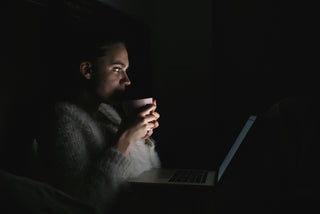You don’t need more discipline. You need a gentler way to end your day.
If you've ever found yourself scrolling through social media at midnight, watching "just one more episode," or wandering the kitchen long after you should be asleep — even when you're exhausted — you're experiencing what experts call bedtime procrastination.
And you're definitely not alone. This common phenomenon affects millions of women, especially those of us juggling careers, family responsibilities, and the never-ending mental load that comes with it all.
Why We Resist Sleep (Even When We're Tired)
The truth is, we don't stay up late because we lack discipline. We stay up because those quiet nighttime hours often feel like the only moments that truly belong to us.
After a day of meeting everyone else's needs, is it any wonder we crave a little time to ourselves — even at the expense of sleep?
At Sippingly, we believe the solution isn't about stricter bedtime rules. It's about creating meaningful evening rituals that help you transition from day to night. And one of the most effective (yet wonderfully simple) rituals is enjoying a cup of sleep-supporting herbal tea.
Replace Screen Time with Tea Time: A 5-Step Evening Ritual
For generations, herbal tea has helped women ease the mind and reconnect with their body's natural rhythm. Calming herbs can gently guide your nervous system from alert to relaxed — without the grogginess of sleep aids.
Here's how to create your own evening tea ritual in 5 simple steps:
1. Choose Your Sleep-Supporting Tea
When shopping for sleep teas, look for these beneficial herbs on the ingredient list:
- Chamomile – Nature's classic sleep soother that reduces anxiety
- Lemon Balm – Calms stress hormones and quiets an overactive mind
- Lavender – Releases emotional tension and relaxes the body
- Passionflower – Especially helpful for racing thoughts and nighttime anxiety
- Valerian Root – A stronger option for occasional restless nights
What to know: Many commercial sleep teas combine several of these herbs for enhanced effectiveness. Research suggests these herbs often work better together than alone — creating what herbalists call a "synergistic effect." For example, the calming properties of chamomile paired with the nervous system support of passionflower can be more effective than either herb by itself.
Finding your perfect blend: Sleep needs vary tremendously from person to person. What works wonderfully for your friend might not have the same effect for you. We encourage you to experiment with different tea blends to discover what your unique body responds to best. Many women find keeping a simple "sleep tea journal" with notes about which blends helped most can be revealing over time.
2. Create a Wind-Down Signal for Your Brain
Turn down the lights. Light a fragrant candle. Change into comfortable loungewear.
These simple actions signal to your brain: the day is complete. You can now let go of responsibilities and prepare for rest.
3. Steep with Presence (5-7 Minutes)
While your tea steeps, take this opportunity to pause.
Breathe deeply. Watch the steam rise. Let this be your first genuine moment of stillness all day.
Tea Tip: Cover your mug while steeping to preserve the beneficial essential oils in your herbs.
4. Pair With a Calming Activity
Choose one gentle activity to deepen your relaxation:
- Gentle stretching to release physical tension
- Reflective journaling to clear your mind
- Reading something uplifting (not work-related!)
- Practice box breathing (inhale for 4, hold for 4, exhale for 4, hold for 4)
Many women find that playing soothing music enhances this experience. Our Pure Meditation playlist was curated specifically for evening wind-down.
5. Sip Slowly — No Multitasking
This is critical: no screens, no chores, no planning tomorrow's schedule. Just be present with your cup.
This mindfulness practice builds a ritual your body will learn to associate with relaxation — and eventually crave more than scrolling.
Consistency Matters More Than Perfection
Some nights your ritual might last 30 minutes. Other nights, perhaps only 5. That's perfectly okay.
What matters is creating a consistent signal to your nervous system that it's time to shift from "do mode" to "rest mode." Even an imperfect ritual, repeated regularly, helps retrain your evening habits.
Why This Works Better Than Willpower
Research shows that bedtime procrastination isn't about lack of discipline. It's about needing transition time between our busy days and sleep.
The warm cup in your hands, the gentle aroma of herbs, the act of sipping slowly — these sensory experiences help regulate your nervous system in ways that simply deciding to "go to bed earlier" never could.
Ready to Start Your Own Evening Tea Ritual?
We've carefully curated a collection of premium sleep-supporting teas from trusted herbalists and wellness brands.
Our bestselling Sleep Tea Discovery Box includes 10 unique herbal blends, each crafted to help women like you rest, unwind, and return to your center. Many customers tell us they've replaced their evening wine with these calming blends — with remarkable improvements in sleep quality.
→ Explore the Sleep Tea Collection
You Deserve Better Than Exhaustion
You don't need to force yourself to bed earlier. You need a reason to slow down. And often, that begins with a simple cup of tea.
Frequently Asked Questions About Sleep Tea
Q: Which herbs are most effective for women experiencing perimenopause or menopause-related sleep issues?
A: Many women in midlife find particular benefit from lemon balm and passionflower, which help manage the hormonal fluctuations that can disrupt sleep patterns during this transition.
Q: How long before bed should I drink sleep-supporting tea?
A: For optimal results, begin your tea ritual 30-60 minutes before you hope to fall asleep. This gives the herbs time to work and your mind time to unwind.
Q: Will I need to use the bathroom during the night if I drink tea before bed?
A: Most herbal sleep teas come in small portions (about 6-8 oz), which typically doesn't cause nighttime bathroom trips for most women. If you're concerned, simply enjoy your tea a bit earlier in your evening routine.
Q: Can herbal tea really replace my social media scrolling habit?
A: Yes! Many of our customers report that after 7-10 days of consistent practice, their tea ritual becomes more satisfying than screen time. The key is creating a complete sensory experience that gives your brain the same "reward" feeling but with actual benefits for your wellbeing.


